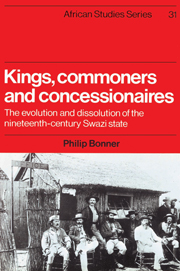 Kings, Commoners and Concessionaires
Kings, Commoners and Concessionaires Book contents
- Frontmatter
- Contents
- List of maps
- List of figures
- Preface
- Map 1 Modern Swaziland
- Map 2 Chiefdoms c. 1820
- 1 Introduction
- 2 The northern Nguni states 1700–1815
- 3 The conquest state 1820–1838
- 4 Factions and fissions: Mswati's early years
- 5 The balance tilts: Swazi–Boer relations 1852–1865
- 6 The deepening and widening of Dlamini power 1852–1865
- 7 Regency and retreat 1865–1874
- 8 Confederation, containment and conciliar rule: Mbandzeni's apprenticeship 1874–1881
- 9 The puff–adder stirs: Mbandzeni and the beginnings of concessions 1881–1886
- 10 The conquest by concessions 1886–1889
- 11 Conclusion
- Appendix
- Notes
- Bibliography
- Index
- KINGS, COMMONERS AND CONCESSIONAIRES
- Frontmatter
- Contents
- List of maps
- List of figures
- Preface
- Map 1 Modern Swaziland
- Map 2 Chiefdoms c. 1820
- 1 Introduction
- 2 The northern Nguni states 1700–1815
- 3 The conquest state 1820–1838
- 4 Factions and fissions: Mswati's early years
- 5 The balance tilts: Swazi–Boer relations 1852–1865
- 6 The deepening and widening of Dlamini power 1852–1865
- 7 Regency and retreat 1865–1874
- 8 Confederation, containment and conciliar rule: Mbandzeni's apprenticeship 1874–1881
- 9 The puff–adder stirs: Mbandzeni and the beginnings of concessions 1881–1886
- 10 The conquest by concessions 1886–1889
- 11 Conclusion
- Appendix
- Notes
- Bibliography
- Index
- KINGS, COMMONERS AND CONCESSIONAIRES
Summary
The Swazi state congealed out of the turmoil and flux of late eighteenth–century northern Nguni society. Expelled from the eastern side of the Lebombo by a rampant Mabudu power bent on the monopolisation of trade, the Swazi were early casualties of the growing integration of the area into European commodity exchange. The dislocation induced by these pressures is suggested by the dynastic schisms of the time, but the Swazi were ultimately able to surmount present adversity and turn it to future gain. Squeezed from the east, they infiltrated the Shiselweni area, lying north of the Pongola and west of the Lebombo, where, through a process of conquest and assimilation, they forged a new and powerful Swazi state.
The area on which they alighted was well suited to their mixed agricultural and pastoral way of life. Like the centres of the Ndwandwe and Mthethwa, two of the other leading northern Nguni states, it boasted particularly desirable configurations of natural resources. Year-round grazing was possible, and the basin of the Ngwavuma River allowed for the easy cultivation of fertile river banks. Cattle and human population multiplied accordingly, particularly in the period of heavier rainfall of the late eighteenth century. From its very inception, therefore, the Swazi state was caught up in the two dynamic forces shaping northern Nguni society: competition for trade both within and between rival chiefdoms, and competition for scarce combinations of natural resources which could underpin a powerful and expansive tributary state.
For the Swazi, as for other northern Nguni societies, these were the real midwives of change.
- Type
- Chapter
- Information
- Kings, Commoners and ConcessionairesThe Evolution and Dissolution of the Nineteenth-Century Swazi State, pp. 208 - 224Publisher: Cambridge University PressPrint publication year: 1983


